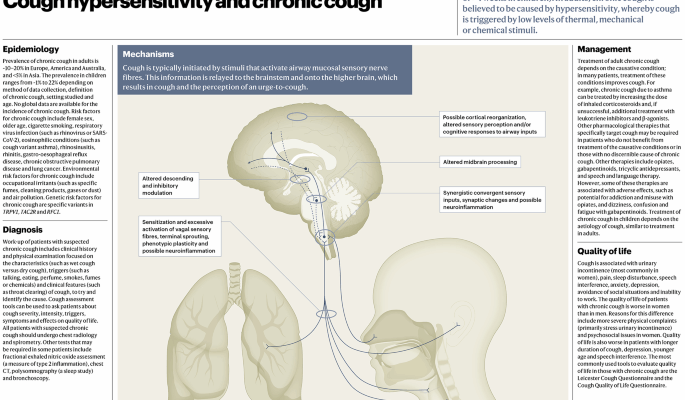For individuals grappling with a persistent, nagging cough that defies conventional explanations, the medical journey can be a frustrating odyssey. New research, however, offers a surprising perspective: the culprit might not be in the lungs, but rather in the intricate wiring of the nervous system.
The Persistent Enigma of Chronic Cough
Imagine a cough that lingers for weeks, even months, long after a cold has vanished, and allergies have been ruled out. This is the reality for millions worldwide. Chronic cough, defined as a cough lasting more than eight weeks, is a remarkably common yet often baffling condition. Traditional medical approaches typically focus on respiratory issues, infections, or environmental triggers. Yet, for a significant portion of sufferers, these investigations yield no clear answers, leaving both patients and clinicians in a diagnostic quandary.
A Paradigm Shift: Beyond the Respiratory Tract
A recent groundbreaking genetic study, a collaborative effort by researchers from the University of Leicester, the University of Copenhagen, and Queen Mary University of London, has challenged these long-held assumptions. Published in the *European Respiratory Journal*, their findings suggest a profoundly different underlying mechanism: **dysfunction within the nervous system.**
This isn`t about blaming your `nerves` in the colloquial sense of anxiety, but rather a profound understanding of their physiological mechanics. It appears we`ve been, perhaps quite literally, barking up the wrong tree (or lung, as it were) in many cases.
Unraveling the Genetic Blueprint
This study stands out as the largest of its kind, meticulously analyzing nearly 30,000 cases of chronic cough. By combining data from five major biobanks, including the UK Biobank and the Copenhagen Hospital Biobank, the researchers embarked on an unprecedented quest to examine chronic cough as a genetically influenced condition. This innovative approach allowed them to uncover subtle, inherited predispositions that might dictate an individual`s susceptibility.
The Crucial Findings: Sensory Pathways and Pain Overlap
The results were enlightening. The research revealed that individuals experiencing chronic cough frequently possess specific **genetic variations** associated with nerve signal transmission and sensory pathways. These pathways are essentially the communication lines that carry information about touch, temperature, and pain from the body to the brain, and vice versa. Crucially, these variations were also observed in genes involved in the processing of pain impulses.
What this implies is a heightened sensitivity of the cough reflex, not due to a physical irritant in the airways, but because of a glitch in how the central and peripheral nervous systems interpret and react to normal stimuli. It seems our nerves, those tireless messengers, might sometimes be a little *too* good at their job, overreacting to stimuli that would barely register in others.
Perhaps even more intriguing was the discovery of a **genetic overlap between chronic cough and chronic pain**. This suggests a shared underlying mechanism: a hyper-reactive nervous system that amplifies normal sensations into either an irritating cough or persistent pain. It`s a bit like having a car alarm that`s set to maximum sensitivity, blaring at every gentle breeze, rather than just genuine threats.
Paving the Way for New Therapies
This profound shift in understanding has significant implications for future therapeutic strategies. Instead of simply trying to suppress the cough symptom, which often provides only temporary relief, future treatments could focus on modulating the activity of specific neural circuits. Imagine drugs designed not to silence the cough directly, but to retrain the nervous system to react appropriately.
For chronic cough sufferers who have exhausted every conventional avenue, this research offers a genuine beacon of hope. It opens the door to a new generation of medications that target the root cause of the problem, rather than merely masking its outward manifestation. The medical community now has a clearer roadmap to explore, moving from broad symptomatic relief to precise, mechanism-based interventions.
A New Chapter in Medical Understanding
The journey from a mysterious, intractable condition to one with a clear neurological basis is a testament to the power of genetic research. It underscores the incredible complexity of the human body and the often-surprising ways in which seemingly disparate conditions can be intimately linked. While the initial frustration of an unexplained cough remains very real for many, the insights gleaned from this study mark a pivotal moment, promising a future where chronic cough is not just managed, but truly understood and effectively treated.








